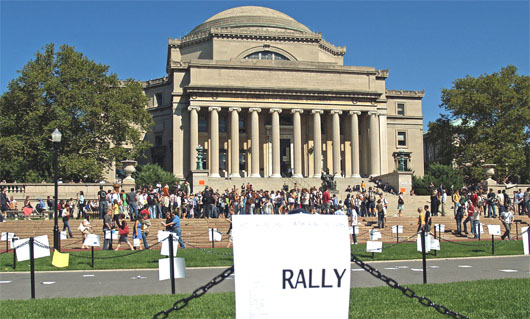Special to WorldTribune.com
UNITED NATIONS — Simmering tensions in the Persian Gulf, resumed uranium enrichment programs, and supporting proxy military operations in Syria’s civil conflict and Yemen headline the current impasse between the West and the Islamic Republic of Iran.
Add the diplomatic deadlock in the wake of the United States pulling out of the so-called Iran nuclear Deal, and there’s serious cause for concern over Teheran’s next moves.
Now as the UN General Assembly approaches, there’s guarded optimism over a possible meeting between Iranian President Hassan Rouhani and Donald Trump on the sidelines of the world gathering. Such an encounter could “break the ice” for further discussions.

The U.S. has toughened economic sanctions on the Islamic Republic, including its once lucrative petroleum sector. Yet it’s Iran’s mullahs who stand to gain should there be some sort of revised “deal” over their proscribed nuclear capacity. Stifling sanctions have crippled Teheran’s standing.
But beyond the geopolitical and the diplomatic assessments, there is one lens which is rarely applied to viewing Iran: the sordid human rights situation inside the country of 83 million people where a corrupt and loathsome regime has instilled a reign of fear, intolerance and stupidity in the fabled land of Persia.
A recent United Nations human rights report on the Islamic Republic of Iran underscores a situation “marked by the ongoing targeting of human rights lawyers and defenders, trade unionists, peaceful protesters and journalists.” The UN High Commissioner on Human Rights “continued to receive reports of torture, arbitrary detention and trials that failed to adhere to international standards.”
Iran’s use and abuse of the death penalty causes particular concern among human rights monitors. The High Commissioner received information “that at least 253 people were executed in 2018, a significant decrease from estimated figures in 2017, when there were at least 437.”
Significantly at least 38 of these executions were for the offenses of “spreading corruption on earth,” and “waging war against God.”
Equally, “The Secretary-General continues to be deeply concerned by the continued sentencing to death of children and alleged child offenders in Iran.” At least 85 children were on death row as of May 2019, “with some at risk of imminent execution.” The survey laments the regime’s prohibition of free trade unions; “the creation of trade unions is prohibited, with the exception of Government-sanctioned Islamic labour councils.”
Media freedoms in Iran are virtually nonexistent. The independent media monitor group Reporters Without Borders ranks Iran near the bottom of the list as 170 out of 179 countries.
The State Supreme Council of Cyberspace (talk about an Orwellian term!) monitors the Internet. The UN report adds moreover that the “High Commission on Human Rights has continued to receive reports of the arbitrary arrest, detention and harassment of journalists, writers and media workers. In 2018, 28 journalists were reportedly detained.”
Naturally the status of women and minorities remains troubling. The report cites deep concern “over the ongoing repression of women human rights defenders who object to compulsory veiling and by the response of the authorities to protests against compulsory veiling.”
Discrimination against ethnic and religious minorities in law and practice continues whether they be Christian converts, Sunni Moslems or members of the Bahai faith.
What the report illustrates is a clear and consistent pattern of oppression which has characterized the Islamic Republic since 1979. This should come as no surprise for a government whose civil, political and religious rights are often framed through a narrow theocratic lens.
Naturally the West Europeans (especially Britain, France and Germany) not to mention Russia, want a diplomatic fig leaf behind which they can resume lucrative business deals with Iran.
Let’s be frank, it’s all about trade and that goes for the USA too, which during the Obama Administration was poised to sell Teheran over $20 billion of Boeing commercial aircraft.
And left-wing solons throughout Europe and the USA moreover continue to rationalize the Iranian ruler’s behavior as having “matured” since the 1979 revolution.
Teheran’s brazenly arrogant but corrupt regime still has not squared the circle; namely how to get away with circumventing the nuclear “deal” reached with the Obama Administration in 2015, but nevertheless, beat the crippling economic sanctions which both Obama and Trump slapped on the Islamic Republic.
Iran’s continuing geopolitical danger extends beyond its shadowy nuclear program; primarily threats to Israel, Saudi Arabia and Arab Gulf sheikdoms. It fuels conflict in Syria and Yemen.
As the Wall Street Journal opined, “If Iran really wants sanctions lifted, then it will have to act like a normal nation, not a revolutionary state.”
John J. Metzler is a United Nations correspondent covering diplomatic and defense issues. He is the author of Divided Dynamism the Diplomacy of Separated Nations: Germany, Korea, China (2014). [See pre-2011 Archives]

 By
By